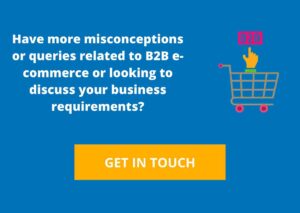
The moment someone mentions e-commerce, our subconscious minds automatically pictures a B2C model or brand.
Fairly so, given that the global B2C e-commerce market size reached a whopping 3,356 billion USD in 2019 and is expected to reach $3,667 billion in 2020.
While it is logical that people prefer to picture an image of ordering groceries or other objects from Amazon than businesses placing orders for some printing equipment or uniforms, B2B e-commerce is not far behind.
However, with this, came the numerous misconceptions and myths around the whole B2B e-commerce industry.
So, we got you this article, to debunk those common myths and enlighten you about the B2B e-commerce world.
1. We do not need a B2B e-commerce store
Well, we had to start with this one, with it being one of the most common misconceptions related to B2B e-commerce.
Most businesses that sell to individual consumers unknowingly either lose out on their opportunity to cater to companies as well or are completely unaware of the fact that they can use the same website for both purposes.
For example, if you sell different kinds of paper and stationery to the general public, you can up your game by serving larger organizations, wholesalers, retailers, or resellers as well.
Many online businesses cater to both B2C and B2B- in most cases, you do not require a separate website to manage both.
You can achieve this by enabling customer group logins and providing a personalized experience to them. You can read more about it from here.
2. B2B e-commerce does not foster personal relationships with clients
In the past, and even now, B2B sales as well as customer satisfaction thrives on personal relationships with clients.
Now, most people believe that technology takes away this personalized and proactive approach.
However, it is not true. In fact, it brings you closer to your business clients while adding pace to the process.
Businesses today look for quick resolutions, when not found, they move to another organization.
An e-commerce platform provides your business with the required tools for great customer interactions.
3. You don’t need a mobile-responsive website for B2B e-commerce
People are of this popular assumption that since it is businesses that we are dealing with, we do not need to design or optimize our site and make it mobile-friendly.
The general perception is that B2B buyers conduct business by sitting in their office in front of their desktop computers.
However, they forget the fact that, similar to B2C, the B2B audience, which today largely comprises of millennials, conduct their research, product and price comparisons, reviews, and sometimes even make purchases over a mobile device.
In this case, if your site is not mobile-optimized, then you will miss out on a lot of traffic, and eventually business.
And finally, most B2B buyers prefer to interact or conduct business over multiple channels rather than sticking to a single traditional channel. So, make sure you have your B2B e-commerce site optimized for mobile users.
4. Once deployed, you don’t need to develop your B2B e-commerce site
Another common misconception among the B2B businesses is that once a B2B e-commerce platform is created, you do not need to continually develop or invest in it, as the customer needs are already being met through the existing one.
However, this perception does not yield good results as time goes by.
In today’s fast-paced world, you need to constantly lookout for changes in the market and stay up-to-date with the latest technologies and integrations for your platform to remain relevant among the audience and ahead of your competitors.
5. My business does not require an online presence…
…said no one ever. However, you might still believe that your product or service is not suitable for online sales.
The internet today offers more possibilities than you can imagine, no matter how unnecessary you may believe.
In fact, it increases the possibilities of configuring or customizing products and services, provides a personalized experience, and also allow you to take proactive actions to improve your business.
With all that said, we can always agree to disagree about the fact that not all businesses or products require an online presence.
However, we at SellersCommerce believe, from big challenges to little kinks in dealing with the manufacturing and distribution of your product or service can be easily ironed out through a B2B e-commerce platform.
